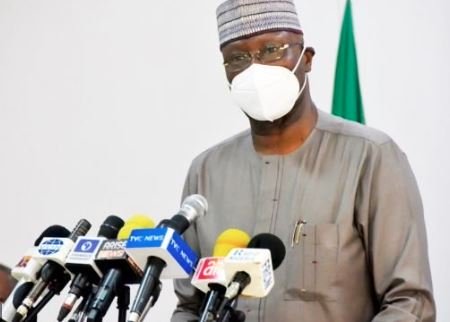The Secretary to the Government of the Federation, Mr. Boss Mustapha, has confirmed that Nigeria will on Tuesday, March 2, receive the first tranche of COVID-19 vaccines.
Mustapha, who is also the Chairman of the Presidential Task Force on COVID-19, made the disclosure on Saturday in Abuja while evaluating the country’s fight against the disease.
“They (vaccines) should depart India on March 1, 2021, in the night and arrive in Abuja on the 2nd of March, 2021, ” he said.
The News Agency of Nigeria (NAN) reports that Nigeria is set to receive its first four million shipment of COVID-19 vaccines from COVAX, a global scheme set up to procure and distribute vaccines for free, as the world races to contain the coronavirus pandemic.
COVAX, which was set up in April 2020 to help ensure a fairer distribution of coronavirus vaccines between the rich and poor nations, said it would deliver two billion doses to member-states by the end of 2021.
Nigeria’s four million vaccines would be its first COVID-19 vaccines from the COVAX facility.
Read Also: Dangote, BUA to Employ Kwankwaso Foreign Scholarship Beneficiaries
The facility promised access to vaccines for up to 20 per cent of participating countries’ population with an initial supply beginning in the first quarter of 2021 to inoculate three per cent of their populations.
The Nigerian government had earlier announced that the first four million doses of the vaccines would arrive in the country by the end of February.
The SGF disclosed that the UN Children’s Fund (UNICEF) would be organising the shipment from Mumbai, India, with the World Health Organisation (WHO), both backers of COVAX.
Meanwhile, the PTF chairman praised Nigeria’s health workers and the various frontline workers for working hard to combat the coronavirus pandemic.
Mustapha, while evaluating the county’s response to COVID-19 in the past year, said the PTF had performed “very well’’ with a very robust national response.
“We have succeeded in discharging our mandate of managing the pandemic with a well-defined process and a robust national response,” he noted.
The SGF said that the strategies evolved by his committee to manage the pandemic had been replicated in some other countries, especially the compulsory Polymerase Chain Reaction (PCR) testing for travellers.
He explained that the pandemic had helped the country to scale up its health infrastructure, citing the increase in the number of infectious diseases testing laboratories from four to 132 across the country.
NAN recalls that the Nigeria’s health minister, Dr. Osagie Ehanire, on Wednesday admitted that the country may have to wait till March to receive its first doses of the vaccines.
Ghana received 600,000 doses of the AstraZeneca vaccines on Wednesday, making it the first country on the continent to benefit from the COVAX programme.
Cote d`Ivoire, a country with more than 32,000 COVID-19 cases and 188 deaths, also received over 500,000 doses of the Oxford-Astrazeneca COVID-19 vaccine on Friday.
It is exactly one year ago, Feb. 27, 2020, that Nigeria detected its first case of the coronavirus disease (COVID-19), believed to be the first reported case in Sub-Saharan Africa.
With more than 150,000 cases reported since then, the NCDC said Nigeria’s response had been led by science and driven by the power of coordination, collaboration and solidarity among federal and state governments, partners, the private sector and the citizens. (NAN)

